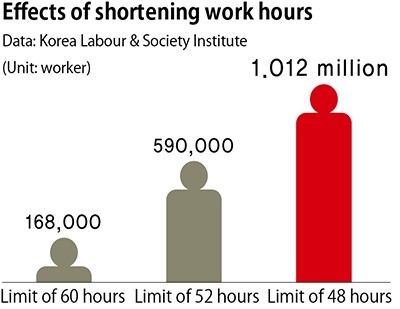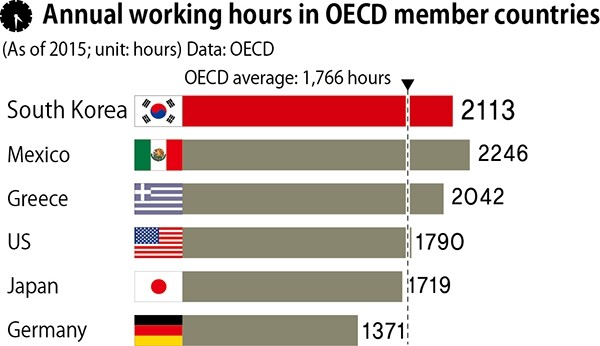hankyoreh
Links to other country sites 다른 나라 사이트 링크
Unions offer to accept fewer hours and lower wages to create jobs for young people

Public sector unions have proposed lowering wages and decreasing working hours as a way to increase employment for young people. This is the first time that organized labor has offered to accept lower wages in exchange for fewer working hours.
“If the next administration takes the initiative in creating more good jobs, converting irregular workers to regular workers and improving working conditions, labor unions in the public sector are willing to go along without clinging to vested interests,” said the Korean Public Service and Transport Workers’ Union (KPTU), a member of umbrella group the Korean Confederation of Trade Unions (KCTU), during a public debate at the National Assembly Library in Seoul on Mar. 14. The debate was organized to encourage the next administration to change its public sector policy.
After stipulating that “creating more jobs will require raising money through tax hikes on the chaebol and increasing the public safety workforce,” KPTU chair Jo Sang-su, one of the speakers in the debate, said, “Workers are also willing to share their jobs and wages by reducing working hours through eliminating long days and reorganizing the shift system and by reducing management assessment bonuses at public institutions.” This implies that regular workers would be willing to accept lower wages resulting from reducing their working hours and their bonuses.
Members of the KTPU include the Korea Railroad Corporation (Korail), the National Health Insurance Corporation, Seoul National University Hospital, Seoul Metro, the Seoul Metropolitan Rapid Transit Corporation, the National Pension Service and the Korea Minting and Security Printing Corporation.

One measure proposed by the KTPU as a way to create more jobs is reducing the average working hours to 40 hours a week by getting rid of overtime. Another proposed measure is reorganizing the shift system from two shifts on alternating days and four teams on three shifts to five teams on three shifts. The KTPU also called for the cancellation of 540 billion won (US$471.85 million) in management assessment bonuses that are supposed to be paid to public companies and quasi-government agencies and to increase the crew on trains and subways from one to two. This would make it possible to hire 53,000 more young people, the KTPU explained. As of 2016, there were around 290,000 executives and workers at public companies.
“Since middle-aged people are forced to work too much and young people struggle to find enough work, it’s a significant and brave decision for labor unions to take the lead in proposing to share their jobs and accept lower wages,” said Noh Gwang-pyo, director of the Korea Labor and Society Institute. Moon Jae-in, former leader of the Minjoo Party, and Lee Jae-myung, mayor of Seongnam, who are both running for president, announced previously that they would create 204,000 and 300,000 jobs, respectively, by reducing the legal limit for weekly working hours from the current level of 68 to 52.
By Jung Eun-joo, staff reporter
Please direct questions or comments to [english@hani.co.kr]

Editorial・opinion
![[Column] Has Korea, too, crossed the Rubicon on China? [Column] Has Korea, too, crossed the Rubicon on China?](https://flexible.img.hani.co.kr/flexible/normal/500/300/imgdb/original/2024/0419/9317135153409185.jpg) [Column] Has Korea, too, crossed the Rubicon on China?
[Column] Has Korea, too, crossed the Rubicon on China?![[Correspondent’s column] In Japan’s alliance with US, echoes of its past alliances with UK [Correspondent’s column] In Japan’s alliance with US, echoes of its past alliances with UK](https://flexible.img.hani.co.kr/flexible/normal/500/300/imgdb/original/2024/0419/2317135166563519.jpg) [Correspondent’s column] In Japan’s alliance with US, echoes of its past alliances with UK
[Correspondent’s column] In Japan’s alliance with US, echoes of its past alliances with UK- [Editorial] Does Yoon think the Korean public is wrong?
- [Editorial] As it bolsters its alliance with US, Japan must be accountable for past
- [Guest essay] Amending the Constitution is Yoon’s key to leaving office in public’s good graces
- [Editorial] 10 years on, lessons of Sewol tragedy must never be forgotten
- [Column] A death blow to Korea’s prosecutor politics
- [Correspondent’s column] The US and the end of Japanese pacifism
- [Guest essay] How Korea turned its trainee doctors into monsters
- [Guest essay] As someone who helped forge Seoul-Moscow ties, their status today troubles me
Most viewed articles
- 1[Column] The clock is ticking for Korea’s first lady
- 2Hong Se-hwa, voice for tolerance whose memoir of exile touched a chord, dies at 76
- 3After 2 months of delayed, denied medical care, Koreans worry worst may be yet to come
- 4[Column] Has Korea, too, crossed the Rubicon on China?
- 5[Correspondent’s column] In Japan’s alliance with US, echoes of its past alliances with UK
- 6US overtakes China as Korea’s top export market, prompting trade sanction jitters
- 7Samsung barricades office as unionized workers strike for better conditions
- 8All eyes on Xiaomi after it pulls off EV that Apple couldn’t
- 9More South Koreans, particularly the young, are leaving their religions
- 10John Linton, descendant of US missionaries and naturalized Korean citizen, to lead PPP’s reform effo